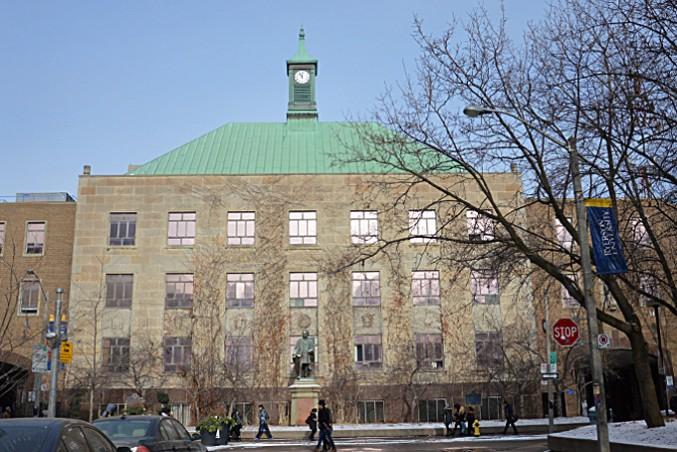By Maggie Macintosh
Jorgenson Hall just became home to the first Indigenous-led think tank in Canada.
The Yellowhead Institute, which published its first report Tuesday, will provide critical analysis on land and governance policies that affect First Nations by Indigenous scholars and allies based out of Ryerson University.
“We need to centre First Nation perspectives on issues that affect them,” Hayden King, a member of the Anishinaabe from Beausoleil First Nation who is the executive director of the Yellowhead Institute, told The Eye.
Titled “Canada’s Emerging Indigenous Rights Framework: A Critical Analysis,” the 28-page report breaks down what the federal government’s move to scrap the Indian Act means and what the new Indigenous rights framework looks like.
“Often in Canada, it’s non-Indigenous policy analysts and pundits who are influencing government and speaking to the media on our behalf, so we’re hoping to change that,” said King.
Six out of seven people on the institute’s advisory board are Indigenous. Peter Di Gangi, a non-Indigenous researcher based in Ottawa, has worked with various Indigenous communities across the country for 35 years.
“What we found is that the federal government is steering First Nations into a very limited version of self-government. It’s a very narrow interpretation of what the rights and title of Indigenous peoples are and it’s a dangerous approach,” King said.
The institute is being funded by Ryerson through both the faculty of arts’ operating budget and Ryerson’s main budget, according to Suelan Toye, a media relations officer for the university. And for now, it’s based out of the first floor in Jorgenson Hall, but King said they’re working on finding a permanent physical space on campus.
In addition to providing First Nation research perspectives, the research centre aims to hold federal, provincial and regional First Nation policy makers accountable. It will also educate the public on the relationship between Indigenous peoples and Canada and shape new governance models.
King, who also doubles as the advisor to the dean of arts on Indigenous education at Ryerson, said he hopes to get Ryerson students involved by hiring Indigenous students as research assistants and writers. The Yellowhead Institute has also established an informal student advisory board, he added.
Shiri Pasternak, research director at the Yellowhead Institute and an assistant criminology professor at Ryerson, said Ryerson will also be getting lots of Indigenous programming, like mentorship opportunities for Indigenous students and public education campaigns, thanks to the new research centre.
The Yellowhead Institute launch comes almost one year after the Ryerson Students’ Union protested Canada 150 with the Colonialism 150 campaign. The campaign outlined a list of 11 demands including a university name change to cut ties with Egerton Ryerson.
“This is kind of a movement of resistance within Ryerson to name a place, the first think tank of its kind, after a leader that we can actually aspire to,” Pasternak said.
Chief William Yellowhead, also known as Misko Aki, governed the territory that Ryerson sits on today, from East Toronto to Muskoka. The Anishinaabe leader defended his people’s land against British encroachment and advocated for unity among First Nations, according to the Yellowhead Institute’s website.
“I think it’s a model for a better way of naming our institutions and a better model of doing politics than Egerton Ryerson’s advocacy for the residential school system,” she said.
For King, setting up the institute on a campus named after Ryerson is “a powerful repudiation” of what he stood for when it came to Indigenous education.













Leave a Reply